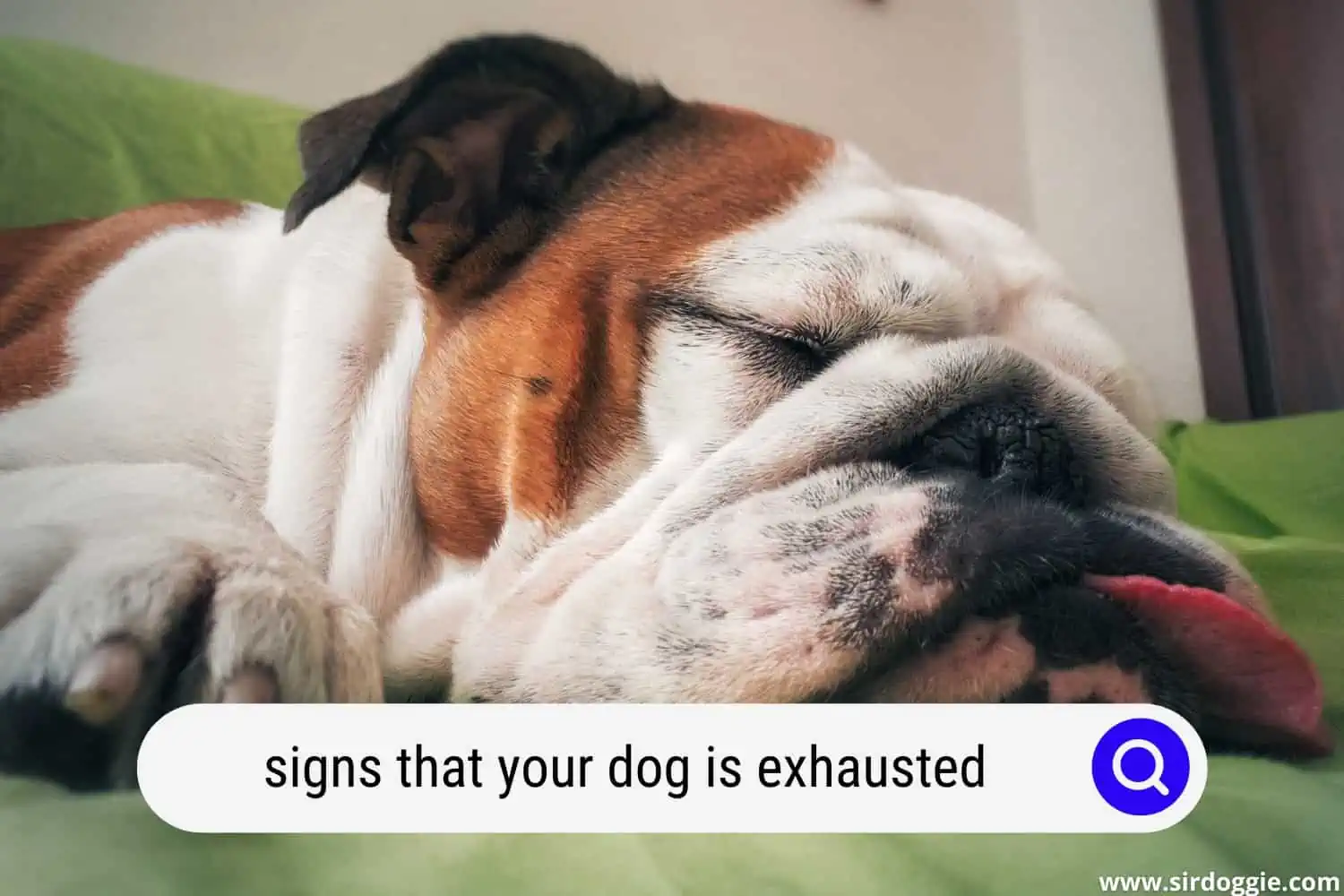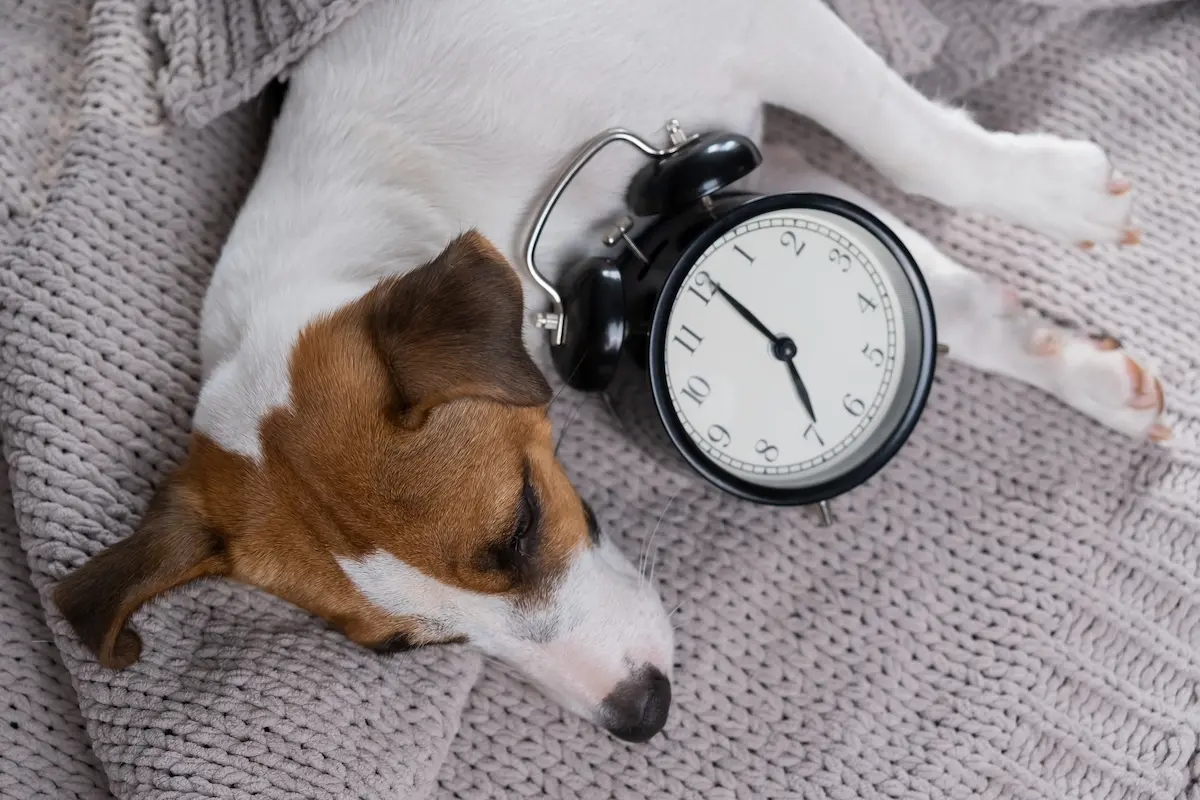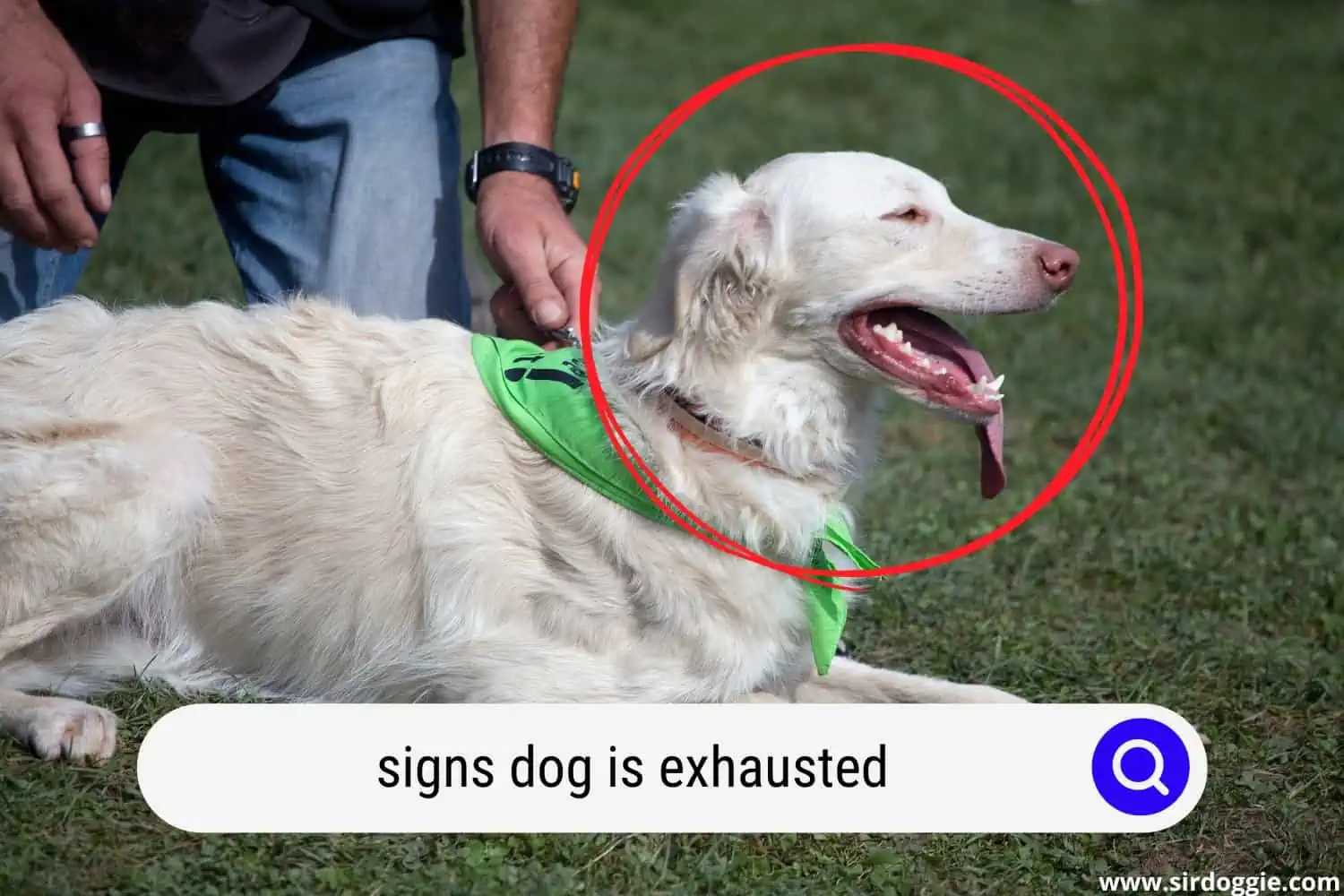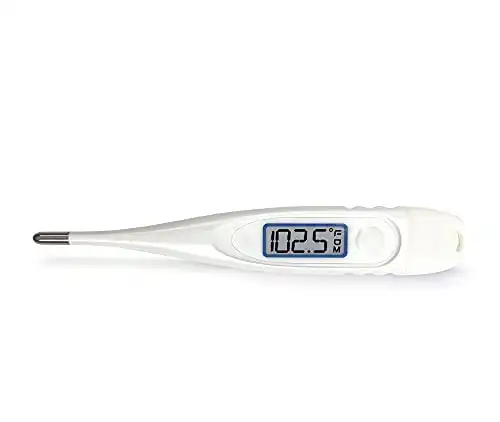Signs Your Dog Is Exhausted | What’s Causing it and What You Can Do
It’s a cause of concern if your otherwise energetic dog drags on a morning walk, is indifferent to their box of toys, or sleeps all day for no apparent reason.
If your doggie is slowing down, looking weak, acting tired, or refusing to play, chances are they are not simply being lazy. Often, dogs that act exhausted or show ongoing signs of fatigue may have a serious underlying condition.
If your dog seems exhausted, it’s important to pay attention to their cues. Keep reading to determine some possible reasons why your furry companion may get exhausted and what you should do about it.

Some of the links in this post are affiliate, and we may earn a commission.
Related Reading: Tips for Walking English Bulldogs
Possible Causes of Exhaustion in Dogs
It’s normal for many dog breeds to slow down a bit after engaging in heavy/vigorous physical activity. For example, after a long day at the dog park or a rigorous hike, your dog may want to spend a couple of hours snoozing. Sometimes dogs can seem to be tired because of too much exercise or perhaps due to weather changes (such as extreme heat or humidity).
However, prolonged fatigue and tiredness should never be ignored.
Exhaustion and lethargy is a red flags for major health issues in dogs; such as heart disease. Moreover, it could also signal other problems, ranging from muscle pain to serious conditions like congestive heart failure.
Some of the potential reasons why your young dog is acting exhausted include:
- Infectious diseases like panleukopenia, parvovirus, distemper, etc.
- Fever
- Congenital heart disease
- Pneumonia
- Anaemia
- Malnutrition
- Parasites; like hookworms, fleas, and ticks
- Dehydration
- Metabolic imbalances
- Poisoning from toxic foods
- Pain or trauma
Some of the potential reasons why your senior dog is acting exhausted include:
- Excess weight
- Cancer
- Osteoarthritis
- Orthopedic, dental, and cancer-related pain
- Diabetes or hypoglycemia
- Heart disease
- Liver problems
- Canine hypothyroidism
- Side effects of medication
- Poisoning or trauma
- Dehydration
- Metabolic imbalances
If your dog is exhausted and sluggish after a long day of activity or from a minor health issue of which you are already aware and treating, there is usually no cause for concern. This type of tiredness and lethargy usually will resolve itself within a day or so. However, if your dog seems to be run down and tired for no reason at all, it is time to give your vet a call to rule out any more insidious causes like those listed above.
Common Signs Your Dog is Exhausted
It is usually easy to tell if your dog is acting tired. It’s really important to know the signs and symptoms of when your dog is not only tired but exhausted. Once your dog is not only tired but exhausted, you should give your fur buddy some time to rest and recuperate.
A tired dog is simply in need of a bit of rest. An exhausted dog, on the other hand, lacks the energy to complete regular daily dog routines. Here are some common signs when a dog is exhausted:
Excessive sleep
Sleep for an extended period, especially lengths of time or times of day you know are unusual for them.
Low energy
You might notice a marked lack of energy. That’s a very clear sign that your dog is exhausted! So when your active dog is lying down and ignoring your invitations for a walk or to play, it’s time for a break for your fur buddy.

Poor mental health
Getting exhausted can also be a sign of poor mental health in your dog. If your dog is depressed, nervous, anxious, or unhappy for any reason, it can manifest in showing exhausted and lethargic behavior.
Yawning
It is the most obvious sign that your dog’s exhausted. A tired dog yawns when it is uneasy and exhausted.
Delayed responses and forgetting commands
When dogs are exhausted, they usually display a delayed response to outside stimuli and the things going on around them. They may or may not respond when you call them.
It’s sometimes difficult to tell if your dog is just trying to be stubborn and difficult, or if it’s incapable of executing your commands. If your dog seems to have forgotten even the simplest commands without any distractions, it’s very likely that your dog is exhausted and needs a break.
Your dog is having the “Zoomies”
Some dogs become hyperactive when they are overtired. You need to observe your dog’s behavior and recognize the time when it starts to become hyper. If there has been a lot going on, it’s a good sign that it’s time for bed for your furry friend.
Excessive panting or lip licking
Panting and licking are perfectly normal until it’s not. Excessive panting and lip licking are simple signs of uneasiness. In case your dog shows these signs after you have worked with it or had a busy day, it can mean that it’s starting to get overtired.
Your dog’s panting may be abnormal if it hasn’t been exercising, is not in a warm/hot environment, and doesn’t need to cool its body down.
Pet parent tip: You can prevent excessive panting caused by heat exhaustion by not exercising your dog in extremely hot or humid weather.
Not acting like itself
Look out for any signs telling you that something’s different. If an excited and playful pooch is lying down by itself, that’s a really rare scenario! Things like these can indicate that it’s time for a nap.
Excessive thirst
If your dog drinks a lot more water than usual, it may signal a health problem. This might also be due to excessive physical exertion. Sometimes, emotional excitement makes your dog thirsty. This is also a sign that your dog will have to rest at some point.
Signs your dog may have diabetes include lethargy, excessive thirst, weight loss, and changes in appetite.
Pet parent tip: If your dog is drinking too much water all of a sudden and urinating more often, do not withhold water from your furry pal. If you do, you may put your dog at risk for life-threatening dehydration. If your dog is overdoing it, get your vet involved to test for diabetes or other health issues.
Lack of interest in playing
If your dog suddenly loses interest in playing, going outdoors for walks, and other things that would normally excite it, take note. Dogs who become less active, less enthusiastic, or seem to lose purpose may be lethargic and exhausted. Give your dog some rest and play again in a few hours.
Hiding
Some dogs that aren’t very social will usually hide if they are getting too overstimulated and exhausted. Hiding behavior is particularly visible in tired dogs with an excess of emotional stimuli, like when you are having guests over. Hiding from people is a very clear indication and very easy to read.
If your dog’s hiding somewhere, leave them there and let them relax until they feel ready for some socializing.
What You Should Do To Help Prevent or Treat Exhaustion in Dogs
If there is a heat advisory or extreme humidity in your area, you should avoid any vigorous exercise with your dog and ensure that they have lots of cool water (and hopefully an air-conditioned area to escape to if they become too hot).
Make sure that your dog always has a safe and comfy place to sleep and ensure that there is no light or noise (as much as possible) while they are sleeping. Making sure your dog is sleeping enough to start is a great way to avoid them becoming overtired.
Access to clean drinking water and appropriate portions of healthy food is also very important to avoid exhaustion. Consider getting very high-quality food and a recommendation from your vet on exactly how much your dog needs, to avoid overfeeding leading to obesity.
If you notice that your dog is looking exhausted or acting lethargic, it’s important not to force them to run or walk quickly. Follow your dog’s lead and allow them to stop playing or decrease their physical activity if necessary.
If your fur buddy is exhausted and lethargic for more than 1 or 2 days, there might be something wrong with him. A very noticeable sign is when your dog doesn’t react to the things it usually likes. That could be a favorite toy, most favorite treat or you calling your dog to go for a walk.
If your dog has been showing signs of exhaustion, but you can’t schedule an immediate appointment with your vet, there are some measures you can take to keep your dog comfortable in the meantime.
Confine your dog
Consider keeping your pooch in a comfortable space. Keep your dog enclosed in a smaller space, such as a cozy crate, for easier monitoring and observation.
Let your dog rest
Cut out the physical activities and let your dog receive sufficient rest to prevent further stress. Long walks and exercise, in general, should be ruled out until you see the veterinarian.
Take your dog’s temperature
You will need to periodically take your dog’s temperature to ensure it does not have a fever. Many dogs with fevers will be very weak, tired, and sluggish. A temperature over 102.9 degrees requires immediate veterinary attention.
Some of the links in this post are affiliate, and we may earn a commission.
Monitor symptoms
Keep a close eye on your furry pal and watch for other serious symptoms. You will also need to monitor your dog for the progression of any symptoms and the development of any new signs. If your dog appears to be in any pain or discomfort or has an unusual change in appetite, these are serious red flags.
If your dog exhibits other unusual symptoms, you should contact your vet right away. These can be signs that your dog needs emergency care.
What Your Vet Can Do
If symptoms of lethargy do not disappear in 24 hours, take your dog to a vet and get it thoroughly examined as soon as possible.
Exhaustion is not a condition that a vet will treat in and of itself. Instead, your vet will look for the underlying cause and attempt to treat those conditions.
Here is what you can expect from your vet if your dog exhibits serious signs of exhaustion:
- History: Usually your vet will begin by asking a few basic questions to help him understand the history of the problem. These questions might include
- When did you first notice your dog was exhausted?
- Has it changed over time?
- How has your dog been acting otherwise?
- Physical examination: Your vet will examine the entire body of your dog.
- Laboratory testing: If there are no other symptoms, your vet might recommend some tests to rule out any other accompanying health conditions. Your vet might order blood, fecal, and/or urine testing to identify any specific infectious or diseases.
- X-rays and imaging studies: If your vet suspects orthopedic pain or cancers, he will order an X-ray, ultrasound, CT scan, or MRI.
- ECG: If your vet suspects heart problems, he might perform an electrocardiogram.
Your vet will also thoroughly go over the nutrition needs of your dog and how to keep your dog hydrated when exercising. The vet will likely come up with a plan on how to safely exercise your dog to prevent it from getting exhausted. All of these tests and treatments can add up, so it is always a good idea to make sure that you have pet insurance, to avoid any unforeseen vet bills.
Is Obesity To Blame For Lethargy In Dogs?
Canine obesity is the most common nutritional disorder seen in dogs. It is also one of the biggest causes of lethargy in dogs. Overweight and obese pooches are more prone to fatigue and lethargy. An obese dog often exhibits noticeable tiredness and unenthusiastic behavior. This is often due to joint pain and difficulty with movement, which puts them off exercising and playing.
Dogs that carry too much weight are also at greater risk of heart problems, cancer, diabetes, and arthritis.
How Much Sleep Does My Dog Need?
Age is a big factor when it comes to how much sleep a dog needs.
- If your healthy dog generally sleeps between 12-14 hours a day, you likely have nothing to be concerned about.
- Puppies might need up to 18–20 hours of sleep to recharge their batteries. They will play and explore their new surroundings until they drop, often many times a day at first.
- Senior dogs tend to need more sleep than young or adult dogs and often take longer to recover from exertion.
However, if your healthy adult dog is sleeping over 15 hours a day, you should pay close attention to how your dog behaves while awake. Keep in mind that large and giant breeds tend to sleep more often than their smaller counterparts.

Final Thoughts
If your dog is very tired and sleeping more than usual due to malnutrition, dehydration, and not enough rest, it is entirely up to you to change his lifestyle.
Regardless of whether you suspect your dog is exhausted suddenly or the issue has been happening for some time, it’s important to speak to your vet about any serious or ongoing symptoms. Because tiredness and lethargy can be attributed to several serious health problems and concerns, they should never be ignored.
Remember that a tired dog is a happy dog! But, an exhausted or overtired dog isn’t!
Related Reading: How Much Time Should A Dog Spend Outside?

Family Dog Expert Author
Hi there! I’m Stuart, a devoted dog lover and family dog expert with over a decade of experience working with our furry companions. My passion for dogs drives me to share my knowledge and expertise, helping families build strong, loving bonds with their four-legged friends. When I’m not writing for SirDoggie, you’ll find me hiking, playing with my beautiful dog, or studying music.
